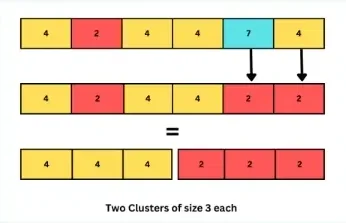Solving a tricky OA problem related to server clustering
Published on
Updated on
The problem
Initially, all applications are deployed on n servers, with varying load handling capacities. The developers want to divide the n servers into clusters of
cluster_sizeeach such that the servers in each cluster have the same load-handling capacity. To achieve this, developers can recalibrate one or more servers. In one move, any server can be reconfigured to handle a lesser load than its current capacity, i.e., in one movecapacity[i], can be changed to any integer value less thancapacity[i].Given the initial capacities of the servers, in an array, capacity, of size n, and an integer cluster size, find the minimum number of moves required to divide the servers into clusters.
Example
Consider
n = 6, capacity[4, 2, 4, 4, 7, 4],cluster_size = 3.An optimal solution is shown.

At least 2 moves are required to obtain clusters of size 3 each.
Function Description
Complete the function
getMinimumMoves in the editor below.
getMinimumMoves has the following parameters:
int capacity[n]: the initial load-handling capacity of the serversint cluster_size: the size of each clusterReturn
int: minimum moves to divide the n servers into clusters as mentioned above
Constraints
- 1 ≤
n≤ 2 * 105- 1 ≤
capacity[i]≤ 109- 1 ≤
cluster_size≤nnis a multiple of cluster size
The approach
-
Sort the
capacitiesby ascending order. - Maintain a priority queue for frequencies of capacities, will be explained later.
-
The initial value of the result (let's call it
requiredMoves) will be the capacities count, will be explained later. -
Start processing from the smallest capacity in
clusterSizechunks. -
Calculate the maximum possible capacity for each chunk (it will be the smallest capacity in that chunk).
- In the priority queue add frequencies of capacities that are less or equal to the calculated maximum possible capacity in the current chunk. We don't add the already added frequencies again. So you have to maintain some kind of cursor and increase it when adding the capacity.
-
Pick from that priority queue the capacities with the highest frequency. You can pick at most
clusterSizefrom that capacities. Let's name the number of that picked capacities asmaxAmountToTransfer. -
Subtract
maxAmountToTransferfromrequiredMoves. -
Subtract
maxAmountToTransferfrom the picked capacities and update the priority queue.
-
Return the final value of
requiredMoves.
Complexity
-
Time complexity:
O(n * log(n)) -
Space complexity:
O(n)(worst case)
Code (JavaScript)
This code uses OrderedMap Because JavaScript doesn't have ordered map. Please include the its code when running it in your environment.
function getMinimumMoves(capacities, clusterSize) {
if (!capacities?.length) {
return 0;
}
// sort in ascending order
capacities.sort((a, b) => a - b);
// OrderedMap is similar to JS map except its keys are sorted.
// please download the source code from here
// https: //www.npmjs.com/package/ordered-map-suren?activeTab=code
// initialize ordered map where the keys are sorted in the descending order by the frequency
const frequenciesPriorities = new OrderedMap((a, b) => {
if (a.frequency !== b.frequency) {
return b.frequency - a.frequency;
}
// just add a second comparison in order to avoid overriding as a duplicate
return b.capacity - a.capacity;
});
requiredMoves = capacities.length;
let lastCapacityIndex = 0,
lastCapacity = capacities[0],
lastCapacityFrequency = 0;
for (let i = 0; i < capacities.length; i += clusterSize) {
// calculate each cluster max possible capacity, it will be the minimum value of capacities
let clusterMaxPossibleCapacity = capacities[i];
for (let j = 1; j < clusterSize; ++j) {
if (capacities[i + j] <
clusterMaxPossibleCapacity) {
clusterMaxPossibleCapacity = capacities[i + j];
}
}
// add the available items to the priority queue
while (lastCapacityIndex < capacities.length && capacities[lastCapacityIndex] <=
clusterMaxPossibleCapacity) {
++lastCapacityFrequency;
const isLast = lastCapacityIndex >=
capacities.length - 1;
const next = isLast ? null : capacities[lastCapacityIndex + 1];
if (isLast || lastCapacity !== next) {
frequenciesPriorities.set({
frequency: lastCapacityFrequency,
capacity: lastCapacity,
}, lastCapacity);
lastCapacityFrequency = 0;
lastCapacity = next;
}
++lastCapacityIndex;
}
// pick the highest priority item
const key = frequenciesPriorities.getNthKey(0);
if (key) {
const maxAmountToTransfer = Math.min(key.frequency, clusterSize);
requiredMoves -= maxAmountToTransfer;
const newFrequency = key.frequency - maxAmountToTransfer;
//delete it from the priority
frequenciesPriorities.delete(key);
// if there are capacities left update and add to the queue again
if (newFrequency) {
key.frequency = newFrequency;
frequenciesPriorities.set(key, newFrequency);
}
}
}
return requiredMoves;
}Please enable JavaScript if you want to test with different inputs.